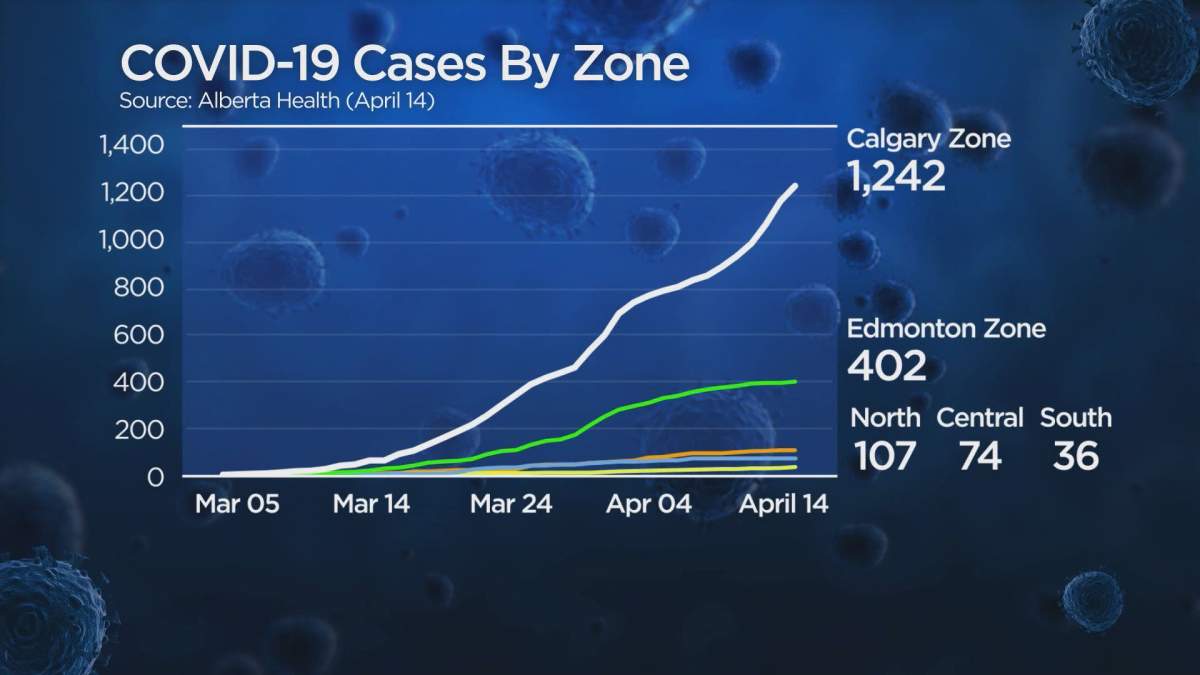It has been more than a month since Alberta’s first case of COVID-19 was announced — and the number of cases continues to climb.

Albertans keen to examine the provincial data will see a major discrepancy in case numbers, especially in Calgary.
Since March 5, cases in the Calgary zone have more than tripled Edmonton’s COVID-19 numbers.
There are more than 1,200 cases in the Calgary region, which accounts for a staggering 60 per cent of the province’s total cases.
So why is that?
Global News spoke to an infectious disease specialist from the University of Calgary who said there were many factors involved. Some of the more apparent factors included early links to international travel, COVID-19 clusters and increased testing.
Dr. Craig Jenne said many of Calgary’s early cases were linked to overseas travel, and while international borders were closed, many travel-related cases in the Calgary area had already spread.
“We had, prior to the lockdown, a very busy international airport, which means we brought a few more cases into the community, which created and seated hot spots that are still unfortunately infecting people today,” Jenne said.
On its website, WestJet listed 69 Calgary flights being impacted by COVID-19. Air Canada did not respond to Global News’ request for numbers, but recent information on impacted COVID-19 flights can be found on the government of Canada website.

Get weekly health news
Calgary also saw a high number of COVID-19 clusters. McKenzie Towne Continuing Care Centre has become Alberta’s deadliest outbreak at a care home.
Officials said a mass gathering in Calgary last month was linked to at least 34 COVID-19 cases. Jenne said these clusters are concerning because they can quickly spread the virus.
“The biggest fear with these clusters is that you do get one person in a room where people are not respecting social distancing or have no ability to social distance… so as a result, one case that doesn’t follow social distancing can lead to dozens and dozens of cases in the coming weeks,” he said.
“Even if 99 per cent of the population is following the regulation, it’s the small handful of people who choose to ignore this that really do represent a risk to the general health of our community.”
Another factor could be increased testing.
On April 8, the province expanded testing criteria to include anyone who lives in the Calgary zone with possible symptoms of COVID-19. On Monday, it expanded that criteria to include all Albertans.
As the province increases testing for the novel coronavirus, that will likely mean there will be more positive tests.
“We’re testing more patients, which means we’re going to have more positive results. More testing just means a more complete picture and not necessarily related to viral spread,” Jenne said.
It doesn’t necessarily mean there is more of the virus in Calgary, only that those cases are now identified, Jenne said. His concern is how many of those cases require hospitalization and intensive care beds.
Another factor at play could be that social distancing is a problem in Calgary.
“We often don’t want to admit it but maybe there is a bit of a social distancing problem in Calgary where people are taking the guidelines more loosely and not following them as strict as in other communities,” Jenne said.
The province told Global News on Wednesday that the situation in Calgary is something it is monitoring closely, adding “it is not yet possible to identify a single cause or reason.”
“Though it may be that the international flights, high testing numbers in Calgary and other factors have all contributed to the case numbers we’ve seen,” read a statement from the health ministry.
Alberta’s chief medical officer of health said earlier this week more data on Calgary COVID-19 trends will be released in the coming days.










Comments
Want to discuss? Please read our Commenting Policy first.